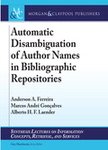版权所有:内蒙古大学图书馆 技术提供:维普资讯• 智图
内蒙古自治区呼和浩特市赛罕区大学西街235号 邮编: 010021

丛 书 名:Synthesis Lectures on Information Concepts, Retrieval, and Services
I S B N:(纸本) 9781681738574;9781681738598
出 版 社:Morgan & Claypool
出 版 年:2020年
主 题 词:information science \u0026 technology\/computer science\/information science \u0026 technology\/databases\/information science \u0026 technology\/computer science
学科分类:08[工学] 0812[工学-计算机科学与技术(可授工学、理学学位)]
摘 要:This book deals with a hard problem that is inherent to human language: ambiguity. In particular, we focus on author name ambiguity, a type of ambiguity that exists in digital bibliographic repositories, which occurs when an author publishes works under distinct names or distinct authors publish works under similar names. This problem may be caused by a number of reasons, including the lack of standards and common practices, and the decentralized generation of bibliographic content. As a consequence, the quality of the main services of digital bibliographic repositories such as search, browsing, and recommendation may be severely affected by author name ambiguity. The focal point of the book is on automatic methods, since manual solutions do not scale to the size of the current repositories or the speed in which they are updated. Accordingly, we provide an ample view on the problem of automatic disambiguation of author names, summarizing the results of more than a decade of research on this topic conducted by our group, which were reported in more than a dozen publications that received over 900 citations so far, according to Google Scholar. We start by discussing its motivational issues (Chapter 1). Next, we formally define the author name disambiguation task (Chapter 2) and use this formalization to provide a brief, taxonomically organized, overview of the literature on the topic (Chapter 3). We then organize, summarize and integrate the efforts of our own group on developing solutions for the problem that have historically produced state-of-the-art (by the time of their proposals) results in terms of the quality of the disambiguation results. Thus, Chapter 4 covers HHC - Heuristic-based Clustering, an author name disambiguation method that is based on two specific real-world assumptions regarding scientific authorship. Then, Chapter 5 describes SAND - Self-training Author Name Disambiguator and Chapter 6 presents two incremental author name disambiguation methods